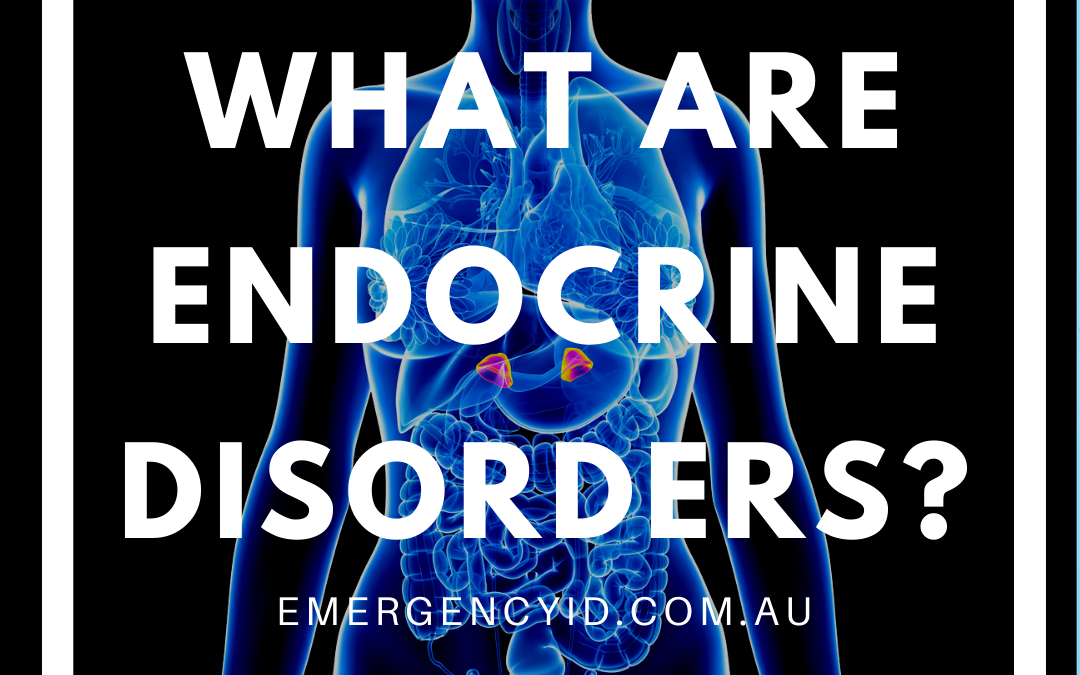Endocrine disorders affect the endocrine system. This system uses glands throughout the body to produce and release hormones, which can affect a number of bodily processes. If hormone levels are too high or too low, or if the body does not respond to hormones correctly, a person may have an endocrine disorder.
Endocrine disordersTrusted Source are medical conditions wherein the endocrine system, which produces hormones, does not function correctly.
Endocrine disorders have several potential causes, such as tumors, genetic factors, or hormonal imbalances. Because these conditions affect hormones, they can cause a wide range of symptoms and influence growth and development, metabolism, sexual function, and mood.
This article discusses the different types and causes of endocrine disorders. It also looks at treatment options and when to contact a doctor.
Definition
The endocrine system is a collection of glands and organs that regulate bodily processes using hormones. Hormones are chemical messengers that travel through the bloodstream to influence bodily processes.
Primary parts of the endocrine system include the:
- hypothalamus
- pineal body
- pituitary gland
- thyroid and parathyroid
- thymus
- adrenal gland
- pancreas
- ovaries
- testicles
These and other parts of the endocrine system regulate a range of processes, including metabolism, reproduction, and growth.
Endocrine disorders occur when one or more partsTrusted Source of the system do not work correctly. This typically causes high or low levels of certain hormones or results in the body not responding correctly to certain hormones. This can lead to problems around the body.
Endocrinology refers to the study of hormones, and an endocrinologist is a doctor who specializes in hormones. These doctors can provide treatment options that can help restore the normal balance and function of the hormones in a person’s body.
Causes
Endocrine disorders have a range of different causes, depending on the condition.
For example, acromegalyTrusted Source and Cushing’s syndromeTrusted Source often result from a tumor in the adrenal or pituitary gland. These tumors are usually noncancerous but still require removal to manage the condition.
Some problems result from hormonal imbalances. For example, hyperthyroidism and hypothyroidism relate to the amount of thyroid hormones the thyroid gland produces and whether it is overactiveTrusted Source or underactiveTrusted Source. Also, high androgen levels in females can cause polycystic ovary syndrome (PCOS).
In some cases, an autoimmune condition causes endocrine problems. For example, type 1 diabetes is the resultTrusted Source of the immune system destroying insulin-producing cells in the pancreas. Graves’ disease is also an autoimmune condition, and it can result in hyperthyroidism.
Common endocrine disorders
There are many different types of endocrine disorders. Some examples include the following.
Diabetes
Diabetes is a condition that causes high blood glucose levelsTrusted Source due to the body being unable to either produce or use insulin sufficiently to regulate glucose. Two of the most common types of diabetes are type 1 and type 2.
Diabetes causes symptoms that include:
- increased thirst and urination
- increased hunger
- unexpected weight changes
- persistent sores
- numbness or tingling in the hands or feet
- tiredness
- blurry vision
Most treatments for diabetes include a combination of lifestyle factors and medications. People with diabetes may require regular insulin medications to help regulate their glucose levels.
Hyperthyroidism
Hyperthyroidism occurs when the thyroid gland produces too many hormonesTrusted Source. The condition has several possible causes, including inflammation of the thyroid gland or Graves’ disease.
Thyroid hormones help regulate energy use throughout the body. This means that the condition can cause a wide range of symptoms, including:
- a rapid or irregular heartbeat
- difficulty sleeping
- irritability and nervousness
- tiredness
- poor temperature regulation
- frequent bowel movements
- weight loss with an increased appetite
- a goiter, which is a growth in the neck
Treatments for hyperthyroidism depend on its cause, the symptoms, and the person’s overall health. They could include medications, radioiodine therapy, or thyroid surgery.
Hypothyroidism
Hypothyroidism occurs when the thyroid does notTrusted Source produce enough hormones. It is the most common thyroid disorder, and it can cause bodily processes to slow down.
Symptoms may include:
- tiredness
- sensitivity to cold
- slow speech
- droopy eyelids and facial swelling
- dry skin
- a slow heartbeat
- muscle cramps
- confusion
- constipation
- weight gain
- tingling in the hands
A doctor may suggest treating the condition with additional doses of thyroid hormones to help manage the symptoms.
Cushing’s syndrome
Cushing’s syndrome occurs when there is an excess of the hormone cortisol. Cortisol helps the body respond to stress, regulate metabolic processes, and maintain blood pressure.
Too much cortisol in people with Cushing’s syndrome can cause symptoms that include:
- weight gain
- thin arms and legs
- a rounded face
- a fatty lump between the shoulders
- excessive hair growth
- muscle weakness
- blurry vision
- decreased fertility and sex drive
- tiredness
- easy bruising and purple stretch marks
The most commonTrusted Source treatment for Cushing’s syndrome is surgery to remove a tumor that is causing the problem.
Acromegaly
Acromegaly occurs when the body makes too much growth hormone. It can result in the unusual growth of bones, organs, and other tissues around the body. For example, it can cause:
- swollen hands and feet
- the growth of facial features
- bone changes, such as a protruding jaw
- thick, dry skin
- sweating and body odor
- a deeper voice
Treatments could include surgery, medications, and radiation therapy to reduce the tumor causing the condition.
PCOS
PCOS occurs when an imbalanceTrusted Source of reproductive hormones may cause problems in the ovaries.
It can cause symptoms that include:
- irregular menstrual cycles
- excessive hair
- acne
- thinning hair
- weight gain or difficulty losing weight
- darkening skin
- skin tags
To treat PCOS, a doctor might suggest hormonal birth control pills, anti-androgen medications, or metformin.
Diagnosis
Endocrine disorders cause a wide range of symptoms. Many of these symptoms overlap with those of other conditions. This can make endocrine disorders difficult to diagnose, and diagnosis may require a number of tools and tests.
For example, a doctor might diagnose an endocrine disorder using:
- urine tests
- imaging scans, such as MRI scans
- genetic tests
- hormone tests
- blood tests
SOURCE & FURTHER INFORMATION Endocrine disorders: Causes, types, and diagnosis (medicalnewstoday.com)








